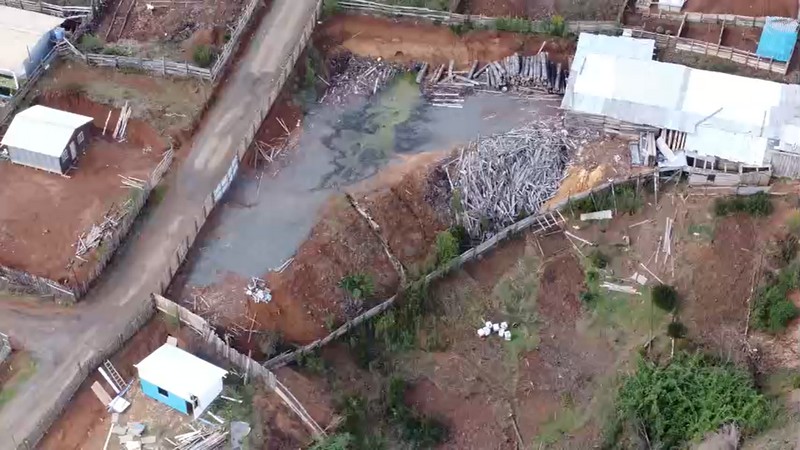Over 50,000 cubic meters of stolen timber, equivalent to roughly $5 billion, are estimated to have been processed in the last two years by clandestine sawmills operating within illegal squatter settlements in Curanilahue, Biobío Region. Forestal Arauco, the company owning the occupied lands, filed a complaint in June 2023, initiating a case that remains under investigation.
Drone footage, now revealed by BBCL Investiga, shows how these illegal businesses operate with complete impunity and without any oversight from authorities.
Indeed, according to the legal filing, a compilation of evidence allowed the company to identify by full name 11 individuals linked to the illegal timber processing.
In total, at least 17 sawmills have been identified operating under the cover of illegal settlements spanning over 550 hectares of land. Over the past two years, they are estimated to have extracted and sold around $5 billion worth of timber.
A Repeated Story
The sawmills in question are spread across five properties where dozens of lightweight housing structures stand. One of them, named San José de Colico, made headlines in 2023 when this Investigative Unit exposed a tourist cabin operating inside an occupied plot. The shocking part? The business was managed and staffed by a municipal employee from Curanilahue.
As stated in the complaint, alongside lightweight housing, machinery and infrastructure typical of timber exploitation and production companies are visible across the occupied sites. However, Forestal Arauco alleges that this is a network of clandestine sawmills operating without any activity records or government oversight.
Thus, the company argues, this illegal economic activity has persisted over time, operating in an organized manner "to facilitate the entry of individuals onto the properties, carry out demarcations, perimeter fencing, construct buildings, install access gates, and set up the necessary equipment for these illegal sawmills."
The complaint filed with the Curanilahue Court of Letters and Guarantees states that the individuals cut down surrounding forests to supply the sawmills. This yields large quantities of timber, often used to continue building homes on the forestry company's land.
These settlements, according to the complaint, "have been established at a dizzying pace, forming irregular settlements that grow daily as forests are cleared and 'ground is gained' for further construction."
Known and "Dangerous"
The legal action claims that one of the accused, when confronted by company workers, responded with threats. This, the company states, demonstrates "the dangerousness and level of organization of these groups."
Additionally, the company criticizes authorities for allowing these unlicensed businesses to operate without municipal permits or patents.
One of the 11 individuals allegedly behind the land seizures and the illegal sawmill network is Patricio Luengo Acuña, a well-known local businessman who—as verified by this outlet—was a founder and director of the Arauco Province Truck Owners' Trade Association (Asoducam).
Modus Operandi?
So far, the investigation led by prosecutor José Ortiz Jiménez—known for heading the failed inquiry into the Tomás case—has not uncovered the final buyers of the sawmill products.
The method used to transport the timber also remains unknown. As this outlet revealed, the preferred modus operandi of timber theft gangs involves falsified shipping guides and invoices, enabling them to launder the products and evade traceability.
For this reason, Forestal Arauco, in its complaint, requests that the Regional Directorate of the Internal Revenue Service (SII) be formally asked to report on the tax status of those implicated.
The company stated they are awaiting the full eviction in the coming months of the La Colcha, San José de Colico, Sauce Parte, and Plegarias properties, where around 550 hectares of their land remain occupied. The first three properties already have eviction orders issued by the appeals court.
Beyond the eviction, the company also hopes those named in the complaint will be convicted of non-violent usurpation and that the vehicles, machinery, instruments, and tools used in the illegal activities will be confiscated.
Source:BiobioChile







Comments (0)
No comments yet. Be the first to comment!
Leave a comment